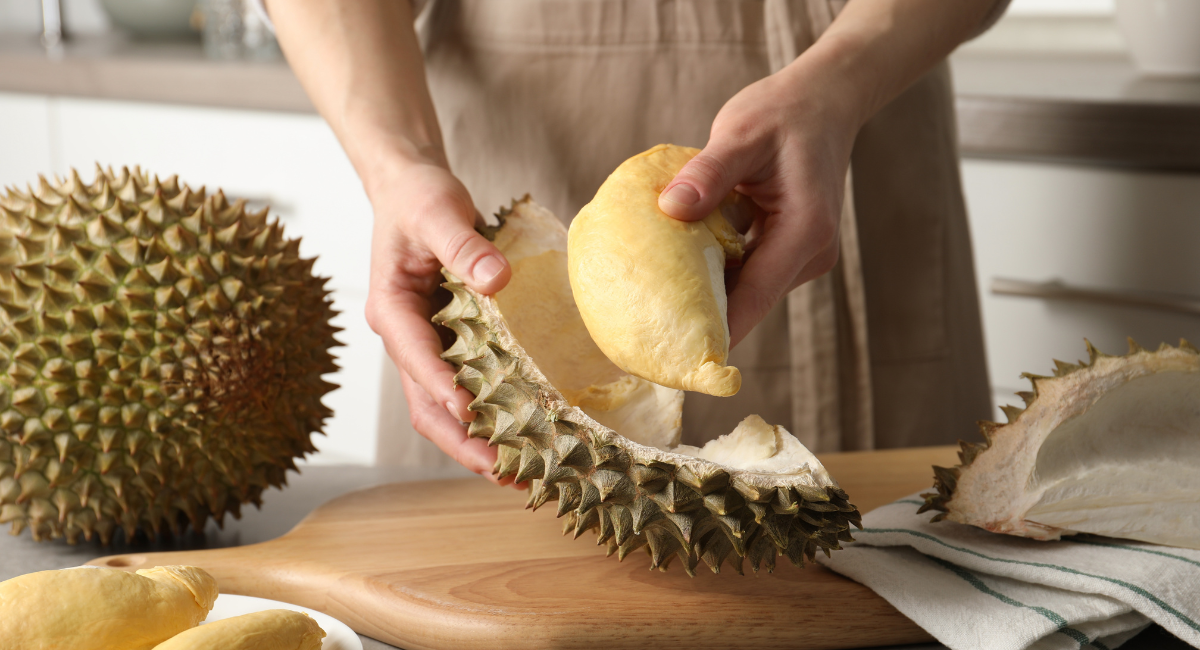For durian lovers in Singapore and the region, durian season always sparks excitement: the beloved King of Fruits is back! But alongside the creamy delight, many long-held beliefs, customs, and burning questions swirl around this unique fruit.
Can you really not drink alcohol with durian? Does it make you “heaty”? And will it pile on the pounds? We’re here to provide medical-backed answers to these and your most common durian queries, with insights from our Doctor Anywhere GPs and Asian Healthcare Specialists doctors.
The “Heatiness” Enigma: What’s Really Going On?
“Why do people drink or gargle with salt water from the durian husk? Does it prevent heatiness/sore throat?”
❌ FALSE
While a popular tradition, there’s no direct scientific evidence that salt water from the husk actively “cools” the body or directly prevents “heatiness.” Drinking any water helps rehydrate and can ease symptoms like a dry or sore throat.
“Will eating mangosteens help to make your body less heaty after taking durians?”
❌ FALSE
Mangosteens are delicious and rich in antioxidants, but they don’t scientifically counteract durian’s perceived “heatiness.” Both are simply healthy fruits; the best way to feel balanced after durian is to drink plenty of plain water.
“Too much durian causes sore throat and ‘heatiness’.”
⚖️ PARTIALLY TRUE
In Traditional Chinese Medicine (TCM), durian is considered a “hot” food, linked to symptoms like a sore throat or mouth ulcers. From a Western medical perspective, “heatiness” isn’t a defined diagnosis. However, consuming a lot of durian can lead to:
- High Sugar Intake: Rapid sugar spikes might cause temporary discomfort or increased thirst.
- Dehydration: High sugar can lead to increased urination. Not drinking enough water can contribute to a sore throat.
- Sulphur Compounds: These unique compounds might cause gas or bloating, which some associate with internal “heatiness.”
Durian & Your Diet: Weight, Pregnancy & Other Concerns
“Eating durian will make you gain weight.”
✅ TRUE
This is a fact if consumed in excess! Durian is calorie-dense due to its high carbohydrate and fat content. Just one medium durian pod (40-60g) has roughly 50-80 calories. To put that into perspective, a single durian seed (flesh included) can pack around 30-60 calories. To burn that off, one would need about 5-10 minutes of brisk walking or climbing 3-5 flights of stairs! A few pods can easily hit 200-300 calories – like a small meal! Consuming an entire durian can easily exceed 1000 calories. Like any other food, if one’s calorie intake from durian exceeds their daily energy expenditure, weight gain will occur.
“Cannot eat durian and drink beer or hard liquor.”
✅ TRUE
This warning has scientific basis! Durian contains high levels of sulphur compounds which can inhibit the enzymes involved in breaking down alcohol in the liver. This can lead to a slower metabolism of alcohol, causing blood alcohol levels to rise faster and stay higher for longer. This may result in symptoms like nausea, vomiting, palpitations, and general discomfort. While rare, there have been anecdotal reports of severe discomfort. It’s best to err on the side of caution and avoid mixing them.
“Eating too much durian in early pregnancy can cause miscarriage.”
❌ FALSE
There is no scientific evidence to support that eating durian, even in early pregnancy, causes miscarriage. However, due to its high sugar and calorie content, pregnant women should consume it in moderation, especially if they have or are at risk of gestational diabetes, to manage blood sugar levels and to avoid unwanted weight gain during pregnancy. Always consult your doctor if you have concerns.
“Is durian safe if I have certain health conditions?”
“Is durian bad for diabetics?”
✅ TRUE
According to Dr. Woo Han Yang, a DA GP, durian is rich in natural sugars and carbohydrates, meaning it will cause a rapid spike in blood sugar levels. While eating durian doesn’t cause diabetes, those managing the condition must be extremely cautious. It’s best to avoid or consume in small, controlled portions, always monitoring blood sugar closely.
“I have high blood pressure and I was told I need to avoid durian.”
⚖️ PARTIALLY TRUE
Dr. Woo advises that for most individuals with high blood pressure, durian in moderation is usually not problematic. Its natural potassium content can even be beneficial for blood pressure regulation in those with healthy kidneys. However, moderation is still key due to its overall calorie content.
“I have a heart condition, like narrowed arteries (Coronary Artery Disease) so I shouldn’t eat so much durian.”
✅ TRUE
If one has Coronary Artery Disease (CAD), where the heart’s arteries are narrowed or blocked, caution is paramount, according to Dr. Woo. Durians contain high levels of potassium. For heart patients, especially those with pre-existing CAD, excessively high potassium levels in the blood can disrupt the heart’s electrical rhythm, potentially causing dangerous arrhythmias (irregular heartbeats).
“People with Kidney problems should not eat too much durian.”
✅ TRUE
According to Dr. Joe Lee, a Urologist at Asian Healthcare Specialists, “Too much durian can be problematic for those with kidney issues.” Impaired kidneys struggle to filter excess potassium, which durian is high in. A large amount can lead to an unhealthy build-up of potassium (hyperkalaemia), impacting heart function and potentially worsening kidney and heart conditions.
Decoding Durian: Smell, Varieties & Nutritional Power
“Why does durian smell like that?”
It’s all about complex volatile compounds. Scientists have identified over 50 different compounds responsible for durian’s infamous aroma, including sulphur compounds, esters, and alcohols. This unique blend creates its powerful, divisive scent – a mix of sweet, sulphuric, fruity, and even onion-like notes. It’s what makes it loved by some and banned in many public spaces!
Do Durian Varieties Differ In Calories?
While durian varieties do boast unique characteristics and flavours, the calorie difference between them is typically minimal and not distinct. Singaporeans are spoilt for choice when it comes to these beloved durian varieties, each with its distinctive profile:
- Mao Shan Wang (MSW): The undisputed king. Known for its intense bitter-sweetness, creamy texture, and sticky flesh.
- D24 (Sultan): A more common, slightly milder, and sweeter option than MSW, with a firmer texture.
- Red Prawn (Hong Xia): Often smaller, with a distinctive reddish-orange hue, a more fruity sweetness, and a slightly alcoholic aftertaste.
- XO: Known for its fermented, alcoholic taste and very soft, watery flesh.
While a general guide for 100g of durian flesh is around 150-180 calories, exact counts vary by ripeness, size, and specific harvest. Mao Shan Wang might be denser, but the biggest calorie difference always comes down to how much one eats, not just the variety!
Enjoying the King of Fruits Responsibly
Durian season is a joy for many, and there’s no reason to completely abstain. By understanding the facts behind the myths, one can make informed choices. Enjoy the King of Fruits, but remember the golden rule: Moderation is key! Balance your durian indulgence with plenty of water, nutritious meals, and regular physical activity.
If you have specific dietary concerns, pre-existing health conditions like diabetes, or are pregnant, it’s always best to consult a Doctor Anywhere doctor for personalised advice.







